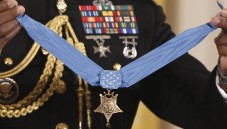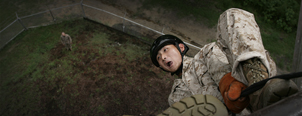When my kid brother left for Iraq he was just that — a kid.
He returned home shattered inside. The “dark pit,” as he calls it, was hidden underneath his gruff, infantry-tattooed exterior. No one in our family could have predicted what he would experience or the after-effects that continue to haunt him today.
Many sailors, soldiers, Marines and airmen return from deployments with Post Traumatic Stress Disorder. As a family member of a person suffering from PTSD, we must be strong for them in a variety of ways to help them combat the disorder.
I received an up-close and personal look at how it can affect a person, when my younger brother came to live with me after separating from the U.S. Army.
| More: Not All Wounds Are Visible. |
Shortly after graduating from the U. S. Army Infantry School at Fort Benning, Ga., my younger brother found his newly-issued boots on the sandy ground in Mosul, Iraq — during a time that would turn out to be one of the bloodiest during the war. His main duties were to provide infantry support to convoys, security detail, and to locate and apprehend insurgents.
He came home with an inescapable burden on his back. He continually woke up, drenched in sweat, with nightmares so real he could still see the terrifying images in his dark room. His mind was filled with the lives he had to take, the friends he lost — some to the enemy, some to suicide — and the near-misses of death’s cold, bony grip on his own neck.
He talked to no one about the sleepless nights and the recurring feelings of depression and hopelessness. The stigma associated with being diagnosed with PTSD kept him from seeking help. The disorder eventually caused him to exit the Army before his enlistment was up. A short time later he’d be living in my finished basement, as my wife and I adjusted to life with our two kids and a newly discharged war veteran.
My brother would continually become overwhelmed with routine things like paying his bills, getting up for work or dealing with relationships. PTSD was winning the battle against him, and he did not know how to fight back.
Even after he hung up his uniform, he still carried himself like an invincible Infantry Soldier. Deep down he knew he needed help, but was still too afraid, ashamed and overwhelmed to seek it.
The year he spent with us was an extremely trying time. As he was learning how to get better, we were learning how to help him. Being a family member of someone who has been diagnosed with combat-related PTSD can be difficult, but the most important thing we did was to provide a stable support system for him.
There were times my brother could be so frustrating that we would get into screaming matches. He would peel out of the neighborhood, the screech of his car tires echoing through the house, and I would pray he came home that night. His behavior became more erratic. I helped him apply for jobs. He would hold one for a short time and then quit, normally after losing his temper or becoming fed-up with it. All of these actions are a correlation to the internal fight he was struggling with.
After much convincing by my wife and I, he finally overcame his fear of the stigma associated with the disorder and went to the local Veterans Affairs medical center, where he was evaluated and given a service-connected disability for PTSD, as well as for injuring his back while deployed, but most importantly access to the tools and programs to fight it.
The nightmares still remained. We continued our support. I gathered research on the subject, finding that a mix of therapy, medication and a healthy lifestyle could decrease the effects. He started taking a prescribed medication and would speak with social workers at the VA hospital regularly. I dragged him to workouts with me and would create healthy athletic competition for us, including intramural sports, which was something he enjoyed and looked forward to all week. We made sure he remembered his appointments, encouraged him in his work and most importantly, ensured that he knew he was a valuable part of our family dynamic. I tried to keep him from getting overwhelmed by telling him to take things “one day at a time.” It became a mantra for us.
It’s been a few years since my brother was in Iraq with an M4 slung over his shoulder. And he’s a long way from the 8-year-old who dugfoxholes in my mother’s backyard while dreaming of being a Soldier. He would never take back his time in the Army and believes very much in his mission in Iraq. When he eventually made me one of the few people he shared his experiences with, he confessed with tear-filled eyes of times he came close to taking his own life. He assured me that war is not glorious or heroic. He did what he had to do because the Soldiers serving beside him needed him, and each one of them would have done the same thing, he said.
After a year with us, he had gotten his PTSD under control, with help from the VA and support from his family. He continues to maintain his appointments, takes his medication, works out on a regular basis and has a steady job. He is living on his own and is still fighting hard.
While there is no clear cut route to helping a family member with combat-related PTSD, the one thing we can do for those close to us who are suffering, is to offer support. Without his family, I don’t know where my brother would be today – if he would even be alive. But I do know that he is winning the war — one day at a time.
| More: Navy Medicine and how they treat Marines. |
-
Killing Time (Bragging Rights)
March 27th, 2012 // By Cpl. Reece LodderFORWARD OPERATING BASE DELHI, Afghanistan — The ragged dartboard nestled between camouflage uniform items and a giant American flag has seen better days. Thousands of tiny holes pockmark its aged cork scoring area. An ever-increasing [Read more...]
-
Sec. Gates bids farewell to troops
June 30th, 2011 // By Robert M. GatesTo the men and women of the United States armed forces: It has been the greatest honor of my life to serve and to lead you for the past four and a half years. All of [Read more...]
-
Reality Check
March 17th, 2011 // By Sgt. Priscilla SnedenIn the past few weeks, Charlie Sheen’s public antics have created yet another Hollywood media frenzy. Every major news organization has covered the star’s breakdown. He has more than 2.8 million followers on Twitter and his [Read more...]
-
Leading by example
March 4th, 2011 // By Sgt. Kuande HallMarines lead, and everyone else follows. This might not be a famous quote that I can attribute to anyone in particular, but I think Marines would agree. Shortly after the statement, members from other services [Read more...]
-
‘The brotherhood of the team’
December 10th, 2010 // By Cpl. Scott SchmidtWe’ve seen it in the movies, and many enlisted Marines may agree, there is a certain skepticism about brand new officers. So, when I got the opportunity to speak with a midshipman playing in the [Read more...]











